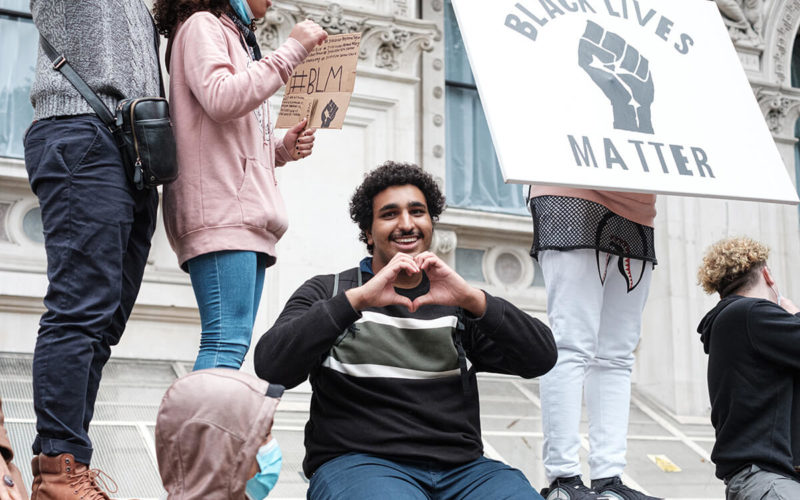“I am my politics,” says Barbara Herring. A Licensed Marriage and Family Therapist and the proprietor of Los Angeles’s JustBTherapy clinic, Herring specializes in working with people of color, LBGTQ+ people, and white allies as they grow. As part of the minority of therapists who are people of color — as of 2015, 66% of psychology professionals were white — Herring says lived experience is at the heart of her work.
“When people, particularly white people, look for me, they have the whole ocean to choose from,” Herring says. “They choose me for a reason.”
For clients of color, that reason is often to find a mental health practitioner sensitive to the joy and trauma of being Black in the United States. For white clients, says Herring, it’s often to ensure personal growth and accountability. “When they choose me, they’re choosing me to have critical conversations.”
Since Minneapolis police killed George Floyd in late May, many of us have been having these critical conversations. For many Americans of color, who are coping with recent police violence, on top of disproportionate devastation from the coronavirus pandemic, this is simply the latest installment of 500 years of traumatic, exhausting post-colonization U.S. history. For white Americans, who may not have deeply considered the reality of racism previously, this conversation may feel new and challenging. “People are coming in and they’re hurting,” says Herring.
Staying Sustainable in the Streets
This pain may be particularly sharp for those who have been taking to the streets, as part of the worldwide wave of protests against systemic anti-Black racism that has particularly rocked the United States since late May. All forms of action against systemic racism are important, but the impact of ongoing police violence against protestors — as well as the sheer physical and mental exhaustion of activism — can make protest a deeply traumatic experience.
At the same time, as Black mental health professionals remind us, the struggle against racism is a movement, not a moment — and for people of color, particularly Black people, it’s an involuntary, lifelong struggle for survival. Staying resilient requires self-care and community healing. But Herring also says that racial differences in lived experience require different approaches to resilience. “I’m telling my Black clients and my people of color clients something different than I’m telling my white clients,” says Herring.
Here is some of the advice Herring offers her clients, and all those who are involved in the long-term fight for racial justice.
Resilience for People of Color
Herring emphasizes one central tenet of sustainability for people of color in struggle: rest. While the fight for racial justice is a personal, life-or-death struggle, Herring also reminds her Black clients that the burden of undoing racism should not fall on them. “We’re having to put our lives on the front lines again for something we didn’t start,” she says.
Herring advises clients and protestors of color to acknowledge the trauma they are experiencing, and honor their own selves and need for healing, by practicing self- and community care.
Acknowledge the trauma
News stories about race and racism have dominated the headlines for the past six weeks, but the trauma of racial violence stretches back hundreds of years. “We’ve been yelling but haven’t been heard,” says Herring.
She encourages people of color, and particularly Black Americans, to acknowledge the trauma caused by both the overt acts of violence and the constant hyper-vigilance that violence may be immanent. “There’s negative language around being a victim,” Herring says. But acknowledging that you have been harmed, and that it’s not your fault, can be a huge step toward healing. “I don’t have to label myself a victim but I’ve been a byproduct of victimhood. It’s been an action toward me, not that I am this thing.”
Trauma can look like rage, sadness, or any number of feelings. No matter what you’re experiencing, says Herring, it’s okay to ask for support. “I think reaching out for help if you need it is really important.”
Take breaks
When you’re fighting for your life and the lives of your loved ones and community, it’s normal to want to do as much as you can. But Herring also reminds activists of color to take breaks, and take care of themselves.
Struggle in the streets is physically taxing and emotionally traumatic. Even if you’ve lived your entire life facing the risk of incarceration and interpersonal violence, being tear gassed, arrested, injured, or seeing other people injured is still incredibly difficult — and physically exhausting. “Going out there every day is too much,” says Herring. “Make sure you’re taking days off.”
Taking time to rest is important both for your own well being and for the wellbeing of the movement. Tired, stressed out, and traumatized people aren’t always able to make the most strategic decisions, and exhaustion can escalate conflicts among protestors, which could otherwise be easily resolved.
Many people feel guilt when they take breaks or wonder if they should be doing more. But Herring says it’s important to remember that white supremacy is not your responsibility even though it is a burden that has been placed on you. “We didn’t create this problem, we don’t need to be guilty of it,” she says.
Instead of pushing yourself beyond your capacity, Herring recommends working from your strengths.“What are your gifts?” she asks. “Go from there.”
Finally, rest is an important part of valuing yourself as a whole person, something white supremacy attempts to take away from people of color. “Do nothing, it’s okay. It’s really okay to rest, sleep. It’s really okay,” says Herring.
Be gentle with yourself
It’s hard to keep a tender place inside of you when fighting for your survival, but Herring says it’s important to keep in touch with joy. Self-care and joy are ways to challenge the white supremacist and capitalist assumptions that people of color are only worth as much as their economic productivity or value to white society.
No one is exempt from the struggle with self-criticism; Herring too found herself feeling guilty she wasn’t in the streets, before reminding herself that providing care, like therapy, is also a vital part of any movement.
That’s why Herring recommends being intentional about doing things that give you joy. “Talk to a friend. Go to therapy. Rest. Take a bath,” she says. The world may not be gentle to you, but you can be gentle to yourself.
Resilience for White People
While people of color, and particularly Black Americans, have no choice but to constantly contend with racism, many white people may find themselves engaging with race and activism for the first time.
Because most white people have not had to actively engage with the trauma of racism or experienced state violence the way Black people have, engaging with the movement can feel overwhelming. It’s okay to feel overwhelmed; it’s a sign that you’re learning and growing.
If you’re not new to the fight against racism and have been taking action against white supremacy for some time, now is a chance to deepen your commitment, and practice self-care so you can stay resilient. If you’ve just recently begun engaging in the struggle against racism, now’s the time to develop your stamina so you can continue this work even when it leaves the headlines. Herring has a message for you: “When people finally get it I’m like, welcome to the fold.”
Above all, it’s important to remember that the struggle against white supremacy is not a favor we are doing anyone: it’s a debt we owe due to the material benefits white people as a whole have gained by exploiting Black people and people of color. “White people need to be out there. It’s their doing,” says Herring.
Racial justice work is also something we should do in accordance with our own values and with the understanding that it is neither ethical nor spiritually healthy to benefit from the exploitation of other human beings.
“This is for humanity or not for humanity,” says Herring. “Which side are you going to fall on?”
Practice humility
If you as a white person started doing racial justice work any time after childhood, you’re late to the movement — about five hundred years late. That’s why even as we progress in our understanding of race and activism, we must continue to acknowledge what we don’t know.
If people of color are doubtful of your intentions or critical of your actions in racial justice spaces, that’s something to take seriously and learn from. Herring says that seeing so many white people engaged in the current movement can be positive, but it’s also something that people of color may feel skeptical of due to centuries of betrayal from self-proclaimed white allies. People of color may look at you and wonder, “Can they keep it up?” says Herring.
Rather than getting defensive about feedback, we can choose to hear it openly, think through it, and internalize the lessons. It’s okay to take some time to sit with your feelings of guilt; it’s not okay to get defensive. This is true humility.
After all, if we are truly engaging in this movement from a place of deep conviction in what is right, rather than a desire to gain acclaim, that conviction will only grow through criticism.
Embrace discomfort
Underlying much of white discomfort in racial justice spaces is guilt, both of the harm we may have directly caused through our racial privilege and the harm our ancestors have caused. Herring says it’s okay to simply experience this guilt, without getting defensive or projecting it onto people of color. “Your ancestors have been egregious. Go ahead and sit with it. It is what it is.”
Building our tolerance for discomfort — physical, mental, and emotional — is a huge part of unlearning white supremacy. “Comfort is a privilege,” says Herring. “We have been living in this discomfort forever and you can do it, too.”
Embracing discomfort may mean having difficult conversations about race with white loved ones, challenging your boss or workplace for their racism, or putting yourself in physical danger at the front lines of protest. These are all ways you can use your privileges to help undo white supremacy.
Guilt and discomfort can keep us paralyzed. It’s okay to notice these feelings of discomfort and simply experience them, but it’s also important to continuously challenge yourself to move through them. “Let’s learn to sit in our discomfort and keep it moving,” says Herring.
Grow through mistakes
The reality of it is, you will make mistakes. We all do. Political work is a lifelong commitment, and no one is fully formed and totally secure in their beliefs and actions. We all have privileges that make us insensitive to the experiences of others; for white people, this is privilege around race.
Learning to grow through mistakes, rather than giving up when you mess up, is part of making sure we’re in this as a movement, not as a trend. “Put your seatbelt on, buckle up, and realize this is a lifetime commitment,” says Herring. You’ll never stop messing up, but you will continuously learn, and you will find yourself making better or different mistakes over time. “That is a muscle building activity,” says Herring.
You will build your stamina for struggle and your ability to take criticism without becoming defensive. It won’t always feel good, but it is for good.
It’s a Relay Race
It’s often said that movements are a marathon, not a sprint. But in truth, as I’ve heard protestors say, it’s truly a relay race. We pass the baton to each other when we need to take a breather, and enter the race again strong.
Racism has existed in America for 500 years. Transforming it is the work of many lifetimes, but it must start now. “These systems of oppression have to be broken down,” says Herring.
The struggle will be hard — and always harder for people of color than for white people. At the same time, says Herring, “You can still give yourself permission to hold some hope.”
Talkspace articles are written by experienced mental health-wellness contributors; they are grounded in scientific research and evidence-based practices. Articles are extensively reviewed by our team of clinical experts (therapists and psychiatrists of various specialties) to ensure content is accurate and on par with current industry standards.
Our goal at Talkspace is to provide the most up-to-date, valuable, and objective information on mental health-related topics in order to help readers make informed decisions.
Articles contain trusted third-party sources that are either directly linked to in the text or listed at the bottom to take readers directly to the source.




